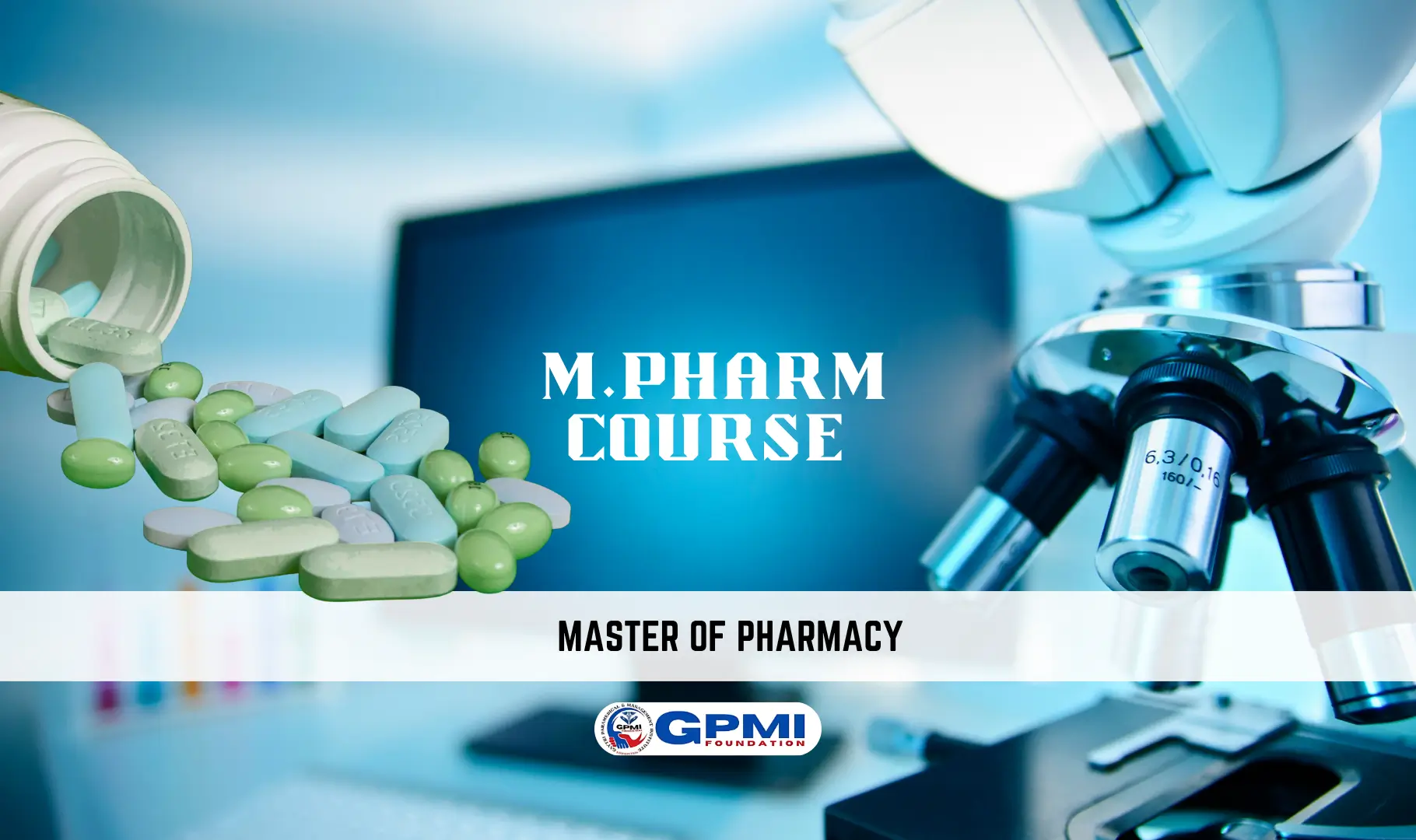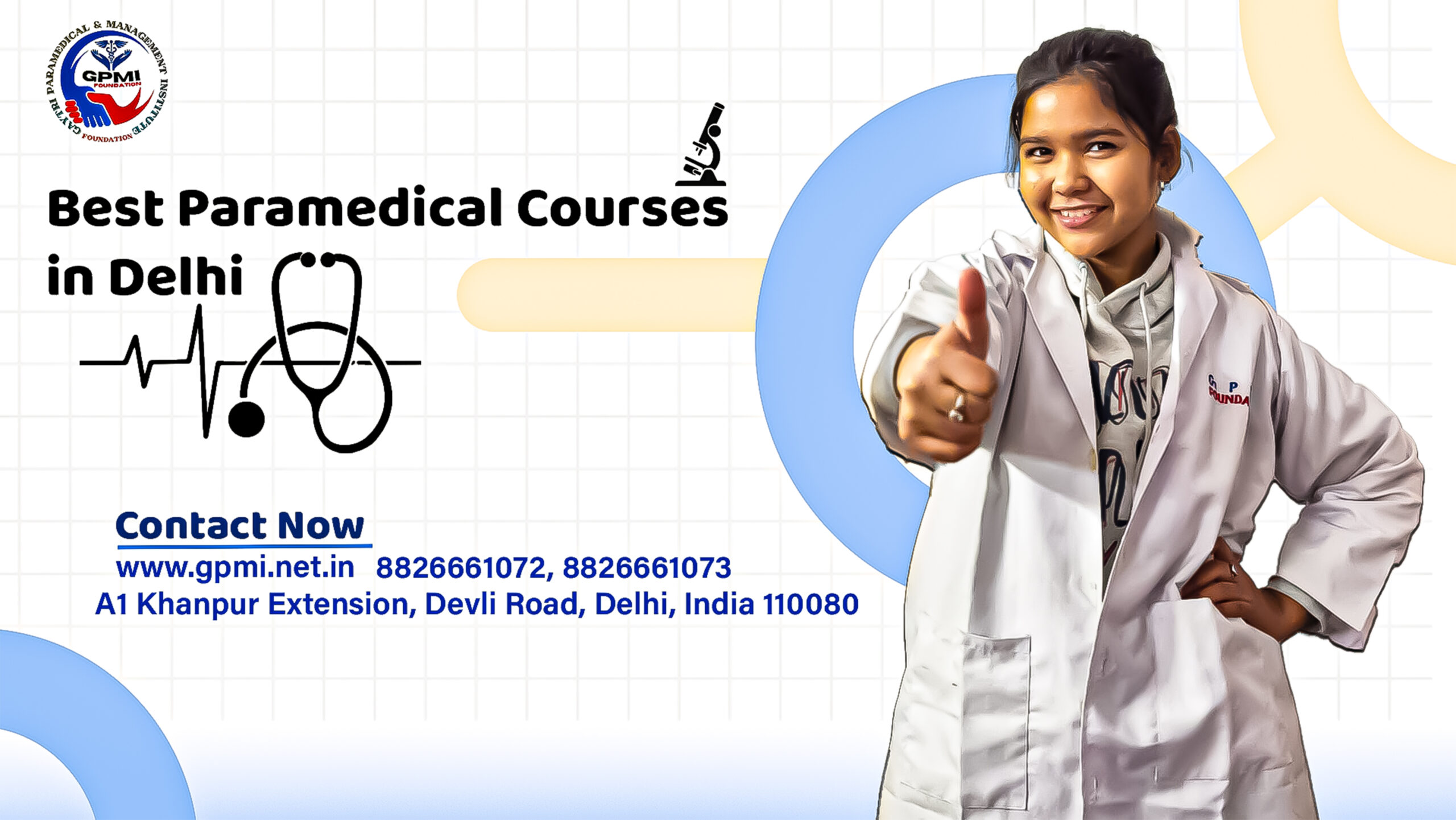Welcome to your ultimate guide on the Master of Pharmacy (M.Pharm): An Advanced Career Path in 2025! If you are curious about what lies beyond a basic pharmacy degree and are eager to unlock exciting career opportunities, you’ve come to the right place.
In 2025, earning an M.Pharm is more than just picking up another academic credential—it’s stepping into a whole new world of expertise in pharmaceutical sciences, research, and healthcare innovation.
In this article, you’ll learn about what an M.Pharm degree involves, the valuable specializations you can pick, and how it can set you apart in competitive fields such as clinical pharmacy, drug development, regulatory affairs, and more. You’ll also get clear insights into eligibility requirements, course structure, job options, and emerging trends shaping the pharmacy sector today.
This guide will prvide the solution for B.Pharm graduates, working professionals, or anyone considering advanced study in the pharmacy field. Get ready to explore why the M.Pharm in 2025 is your launchpad to a rewarding and future-ready career!
Table of Contents
What is M Pharmacy Course?
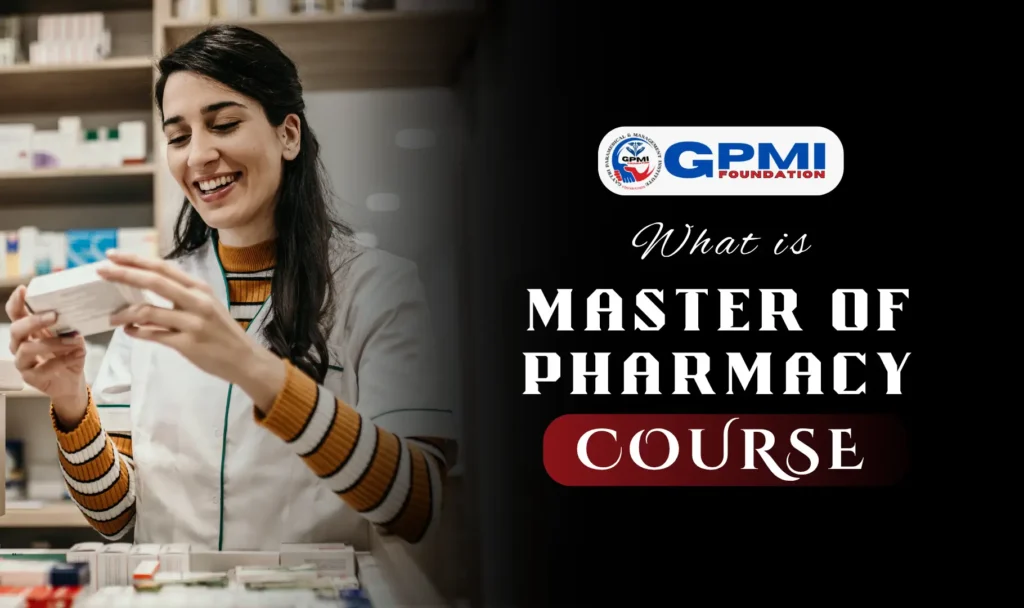
The M Pharmacy course, also known as Master of Pharmacy, is a 2-year postgraduate program for students who have completed their B.Pharm degree. It is designed to give deeper knowledge and hands-on experience in areas like drug development, research, quality control, and clinical trials. If you are passionate about making a difference in healthcare through science, then this course is a perfect choice for you.
When we talk about M Pharmacy course, it’s important to know that it comes with different specializations. One of the most popular choices is the Master of Pharmacy in Pharmaceutics. This branch focuses on how medicines are made, tested, and delivered in the body. You’ll learn about advanced drug formulation, biopharmaceutics, and pharmaceutical technology.
The M.Pharm course not only improves your technical skills but also opens doors to high-level jobs in pharmaceutical companies, hospitals, and research labs. It’s a smart step forward for a bright and stable career in pharmacy.
Master of Pharmacy Course Details
Are you curious to explore a career in pharmacy after your basic studies? This section will walk you through everything you need to know. Here, we talk about the M Pharmacy course details after 12th and graduation, giving you a clear idea of what to expect when planning your higher education in the field of pharmacy.
Master of Pharmacy Course Duration
- Master of Pharmacy Duration After Graduation: The duration of the M Pharmacy course after graduation (i.e., after completing B.Pharm) is 2 years. It is a full-time postgraduate program divided into 4 semesters.
- M Pharmacy Course Duration After 12th: You cannot take admission into M.Pharm immediately after 12th. The duration of m pharmacy course after 12th to complete an M Pharmacy degree is 6 years (4 years B.Pharm Graduation Degree + 2 years M.Pharm).
M Pharmacy Course Eligibility
To get admission in the Master of Pharmacy (M.Pharm) course, you must meet the following eligibility criteria:
- Educational Qualification: You must have a B.Pharmacy (Bachelor of Pharmacy) degree from a recognized university.
- Minimum Marks: Most colleges require at least 50% to 60% marks in B.Pharm. Some institutes may have category-based relaxation.
- Entrance Exam (if applicable):
- Many universities accept scores from entrance exams like GPAT (Graduate Pharmacy Aptitude Test).
- Some private colleges conduct their own tests or offer direct admission based on merit.
- Internship/Registration (in some states): A few colleges may ask for proof of internship or registration with the State Pharmacy Council.
In short, to be eligible for the M Pharmacy course, you must be a B.Pharm graduate with required marks, and depending on the institute, you may need to clear an entrance exam.
M Pharmacy Course Fees
The M Pharmacy course fees can vary depending on whether you choose a government or private college. Here’s a simple breakdown of M Pharmacy course fees in India based on the type of institution:
- Government Colleges Fees: Fees range from ₹20,000 to ₹60,000 per year, Lower cost for GPAT-qualified students. May offer stipends or scholarships for industrious students.
- Private Colleges Fees: Fees range from ₹1,00,000 to ₹2,50,000 per year. Cost depends on infrastructure, faculty, and location. Some reputed private colleges may charge up to ₹3–4 lakhs total. Easy admission in some colleges through direct entry or management quota
Tip: Always compare college facilities, placement support, and course quality before deciding based only on fees.
Master of Pharmacy Salary
The salary after Master of Pharmacy (M.Pharm) depends on your experience, specialization, and job role. Here’s a general breakdown:
- Fresher (0–2 Years): Average salary: ₹2.5 to ₹4.5 Lakh per annum as Trainee Pharmacist, Production Executive, Research Assistant, QA/QC Analyst. Government jobs and fellowships may start around ₹30,000/month.
- Mid-Level (3–5 Years): Salary range: ₹5 to ₹8 LPA as Clinical Research Associate, Drug Safety Officer, Regulatory Affairs Executive.
- Experienced (5+ Years): Salary can go up to ₹10–15 LPA or more on senior positions as R&D Manager, Pharmaceutical Scientist, Project Lead, Regulatory Manager.
Bonus: M.Pharm professionals with a Ph.D., GPAT score, or international exposure often earn even higher packages.
M Pharmacy Course Subjects
The M Pharmacy course subjects are divided based on specialization but include core pharmaceutical science topics. Here’s a list of important subjects, especially for M.Pharm in Pharmaceutics and related fields:
Core Subjects:
- Advanced Drug Delivery Systems
- Modern Pharmaceutics
- Pharmaceutical Technology
- Biopharmaceutics and Pharmacokinetics
- Regulatory Affairs and Quality Assurance
- Research Methodology and Biostatistics
- Pharmaceutical Analysis and Quality Control
Specialization-Based Subjects (Examples):
- Clinical Pharmacy & Therapeutics (for Clinical Pharmacy)
- Advanced Pharmacology (for Pharmacology)
- Phytochemistry & Pharmacognosy (for Pharmacognosy)
- Medicinal Chemistry (for Pharmaceutical Chemistry)
Additional Components: Laboratory practicals, Seminar presentations, Thesis/Dissertation work, Project-based research.
These subjects help M.Pharm students develop technical skills in drug development, clinical research, and regulatory standards—preparing them for careers in pharma industries, research institutions, and healthcare sectors.
Top Career Options After M.Pharm

Completing your Master of Pharmacy (M.Pharm) opens the door to many exciting and well-paying job opportunities. With your advanced knowledge and practical skills, you can work in different sectors of the healthcare and pharmaceutical industry. Below are some of the top career options after M.Pharm:
- Pharmaceutical Scientist: He works in labs to discover new medicines or improve existing ones. They test drug safety, study chemical interactions, and help develop better treatments for various diseases.
- Production and Manufacturing Executive: He in the pharmaceutical industry oversees the large-scale production of medicines. They ensure proper processes, maintain hygiene standards, and make sure drugs are manufactured safely and efficiently.
- Quality Control (QC) or Quality Assurance (QA) Officer: He ensures that medicines meet safety, purity, and quality standards. They test samples, maintain records, and help follow strict industry and government guidelines.
- Clinical Research Associate (CRA): He plays a key role in testing new drugs through clinical trials. They monitor study sites, collect data, ensure ethical practices, and help determine a drug’s safety and effectiveness.
- Regulatory Affairs Executive: He ensures that pharmaceutical products comply with all national and international laws. They prepare and submit approval documents, handle licenses, and communicate with regulatory agencies to keep products legally safe for use.
- Hospital or Clinical Pharmacist: He works in healthcare settings, helping doctors and patients with the correct use of medicines. They check prescriptions, guide on dosage, and ensure safe and effective drug use during treatment.
- Teaching & Academia: This is a rewarding career option after M.Pharm, where you can become a lecturer or professor in pharmacy colleges. You’ll educate future pharmacists, conduct research, and contribute to academic development in pharmaceutical sciences.
- Pharmacovigilance Expert: He monitors and analyzes the side effects of medicines after they are released in the market. They collect safety data, report adverse reactions, and help ensure public health by improving drug safety standards.
- Medical Writing & Communication: It involves creating scientific documents such as research papers, drug manuals, and clinical reports. Medical writers simplify complex medical information for doctors, regulators, and even the general public.
An M.Pharm degree not only gives you knowledge but also builds a strong platform for a stable and respected career.
M.Pharm vs Pharm.D: Which is Better?
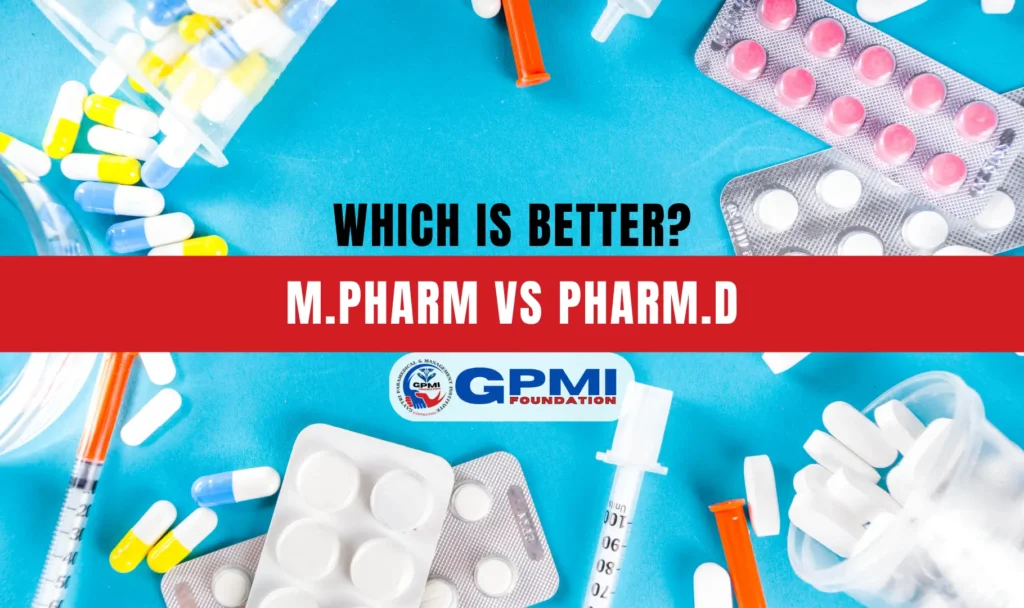
Choosing between M.Pharm and Pharm.D can be confusing for pharmacy students planning their future. Both courses offer promising career paths but serve different purposes in the pharmaceutical and healthcare industries. Here is comparative details to help you decide: M.Pharm vs Pharm.D – which is better?
| Feature | M.Pharm (Master of Pharmacy) | Pharm.D (Doctor of Pharmacy) |
|---|---|---|
| Course Duration | 2 years (after B.Pharm) | 6 years (after 12th) or 3 years (after B.Pharm as Pharm.D Post Baccalaureate) |
| Eligibility | B.Pharmacy degree | 10+2 with PCB/PCM (for regular Pharm.D) OR B.Pharm (for Post Baccalaureate) |
| Focus Area | Research, Manufacturing, Formulation, QA/QC | Clinical Practice, Patient Care, Hospital Pharmacy |
| Career Fields | R&D, Production, QA/QC, Regulatory Affairs | Clinical Pharmacist, Hospital Pharmacist, Drug Therapy Expert |
| Internship/Practical | Project + lab work | 1 year of compulsory clinical internship |
| Prescribing Rights (India) | No | Limited clinical advice (No independent prescribing rights) |
| Global Recognition | Recognized, but mostly technical roles abroad | More aligned with clinical pharmacy in Western countries |
| Higher Studies/Ph.D. | Yes, eligible | Yes, eligible |
| Best for | Students interested in pharma industry, research, teaching | Students interested in clinical work and patient care |
Choose M.Pharm if you want to work in drug research, production, or teaching. Choose Pharm.D if you’re passionate about clinical pharmacy, hospital work, and direct patient care.
Master of Pharmacy vs MBA in Pharma
Both programs offer unique career paths—one focused on technical expertise, the other on business leadership. here is a comparative details that help you explore the key differences between M.Pharm vs MBA in Pharma.
| Feature | Master of Pharmacy (M.Pharm) | MBA in Pharmaceutical Management |
|---|---|---|
| Course Type | Academic/Research-focused | Management/Business-focused |
| Eligibility | B.Pharm (Bachelor of Pharmacy) | B.Pharm, B.Sc., B.Tech, or any graduation (some prefer science stream) |
| Course Duration | 2 Years | 2 Years |
| Focus Area | Drug formulation, research, quality control, pharmacology | Pharma marketing, sales, supply chain, management, and business strategy |
| Career Goal | Technical expert in R&D, production, regulatory affairs | Managerial roles in pharma companies, marketing, product management |
| Job Roles | Research Scientist, QC Analyst, Pharmacologist, Regulatory Officer | Pharma Product Manager, Sales Manager, Brand Manager, Business Analyst |
| Work Environment | Labs, pharmaceutical industries, research centers | Offices, corporate pharma companies, marketing firms |
| Average Starting Salary | ₹3 to ₹6 LPA | ₹4 to ₹8 LPA (can be higher with top B-Schools) |
| Higher Studies Option | Ph.D. in Pharmacy or related fields | Executive MBA, Certifications in Business or Pharma Strategy |
| Best For | Students interested in drug science, R&D, and technical roles | Students interested in business, leadership, and pharma industry growth |
Top M.Pharm Specializations in Demand
Here are some of the top M.Pharm specializations in high demand in India and globally in research labs, manufacturing units, and global pharma companies due to their practical relevance and job prospects.
- M.Pharm in Pharmaceutics: Focuses on drug formulation, manufacturing, and delivery systems. Highly demanded in pharmaceutical industries for R&D, production, and formulation development roles.
- M.Pharm in Pharmacology: Centers around the effects of drugs on the body. Opens up opportunities in clinical research, drug safety, pharmacovigilance, and academic research.
- M.Pharm in Pharmaceutical Chemistry: Involves chemical analysis, drug synthesis, and quality control. Suitable for roles in analytical labs, R&D, and regulatory affairs.
- M.Pharm in Regulatory Affairs: Deals with legal and quality standards of drug approval. In demand in companies dealing with global drug marketing, compliance, and documentation.
- M.Pharm in Clinical Pharmacy: Prepares students for hospital pharmacy roles, focusing on direct patient care and clinical drug evaluation. Ideal for those aiming to work in hospitals or clinical setups.
- M.Pharm in Pharmacognosy: Involves the study of medicines derived from natural sources. Offers career opportunities in herbal drug industries, research, and natural product formulation.
- M.Pharm in Quality Assurance (QA): Focuses on maintaining quality standards in manufacturing. Highly in demand in pharma production, QA, and auditing departments.
These specializations offer multiple career options depending on your interest in research, industry, hospital, or regulatory sectors.
Top M.Pharm Colleges in India
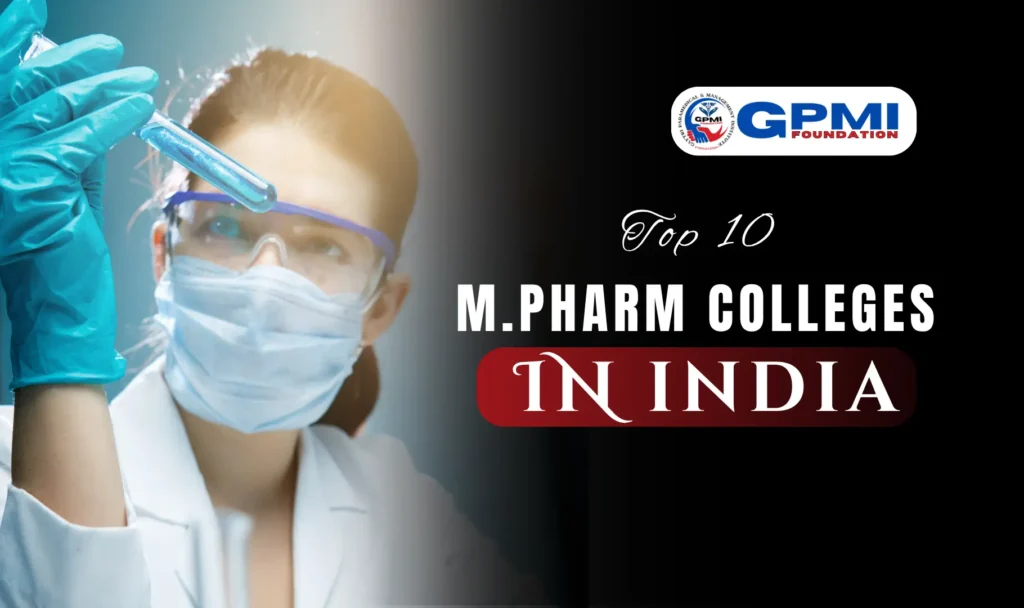
With growing demand for skilled pharmacists in research, industry, and healthcare, top institutions now offer advanced infrastructure, experienced faculty, and strong placement support. Here are some of the Top M.Pharm Colleges in India known for quality education, research infrastructure, and placement opportunities:
| College Name | Location | Notable Highlights |
|---|---|---|
| National Institute of Pharmaceutical Education and Research (NIPER) | Mohali (Punjab) | Premier institute, excellent research facilities, high placement rates. |
| Jamia Hamdard University | New Delhi | Renowned for M.Pharm programs, NAAC ‘A’ grade, well-equipped labs. |
| Manipal College of Pharmaceutical Sciences (MCOPS) | Manipal (Karnataka) | Accredited by NBA, excellent faculty, top-ranked in pharmacy education. |
| Institute of Chemical Technology (ICT) | Mumbai (Maharashtra) | Research-driven curriculum, strong industry collaboration, great placement support. |
| BITS Pilani – Pharmacy Department | Pilani (Rajasthan) | Focus on innovation, strong alumni network, reputed faculty. |
| JSS College of Pharmacy | Ooty & Mysuru | Offers a variety of M.Pharm specializations, good academic environment. |
| Poona College of Pharmacy | Pune (Maharashtra) | Part of Bharati Vidyapeeth, excellent labs and experienced professors. |
| Punjab University – University Institute of Pharmaceutical Sciences (UIPS) | Chandigarh | Strong academic legacy, excellent research output. |
| Amrita School of Pharmacy | Kochi (Kerala) | Known for clinical exposure and academic excellence. |
| SRM Institute of Science and Technology | Chennai (Tamil Nadu) | Offers diverse specializations, modern infrastructure, and good placements. |
Conclusion
The Master of Pharmacy (M.Pharm) is a strategic and rewarding choice for students aiming to advance their careers in the pharmaceutical field. With its specialized streams like Pharmaceutics, Pharmacology, and Clinical Pharmacy, this postgraduate program not only deepens scientific knowledge but also opens doors to research, teaching, manufacturing, regulatory affairs, and managerial roles.
Whether one chooses to pursue M.Pharm or alternatives like Pharm.D or MBA in Pharma, the core advantage of M.Pharm lies in its balance between theoretical insight and practical skills. It is particularly suited for those who want to remain closely involved with drug formulation, research, and academia.
In current scenario as the pharmaceutical industry continues to grow, M.Pharm graduates will be in strong demand both in India and abroad, making it a smart and future-ready career path.
Master of Pharmacy How Many Years?
The Master of Pharmacy (M.Pharm) course typically takes 2 years to complete. It is a postgraduate program designed for students who have already completed a Bachelor of Pharmacy (B.Pharm). The course is divided into 4 semesters and includes both theoretical studies and research-based practical training.
Which is better, B Pharm or MPharm?
M.Pharm is generally considered better than B.Pharm if you’re looking for advanced knowledge, research opportunities, and higher-paying job roles. While B.Pharm is the minimum requirement to start a pharmacy career, M.Pharm opens doors to specialized fields, teaching roles, and pharmaceutical research.
Is MPharm equal to Doctor?
No, M.Pharm (Master of Pharmacy) is not equal to a doctor. It is a postgraduate degree focused on pharmaceutical sciences. While M.Pharm graduates are experts in medicines and drug development, they are not medical doctors (MBBS) or Pharm.D holders, who hold a doctorate-level qualification.


